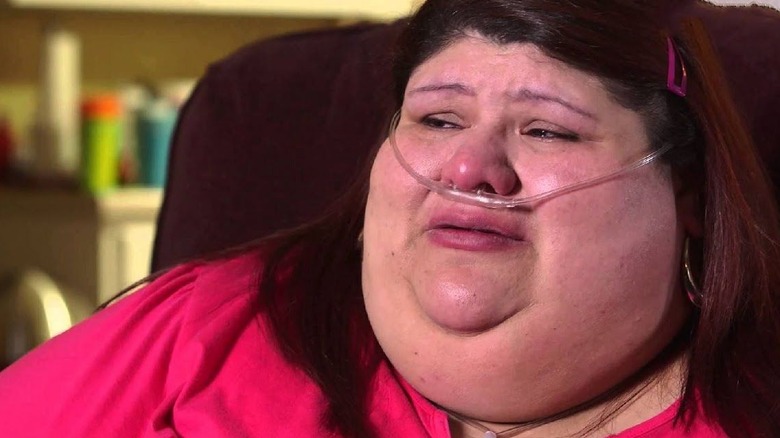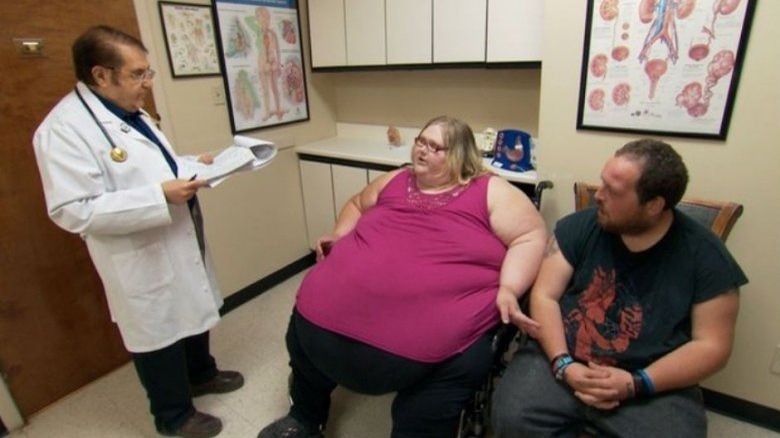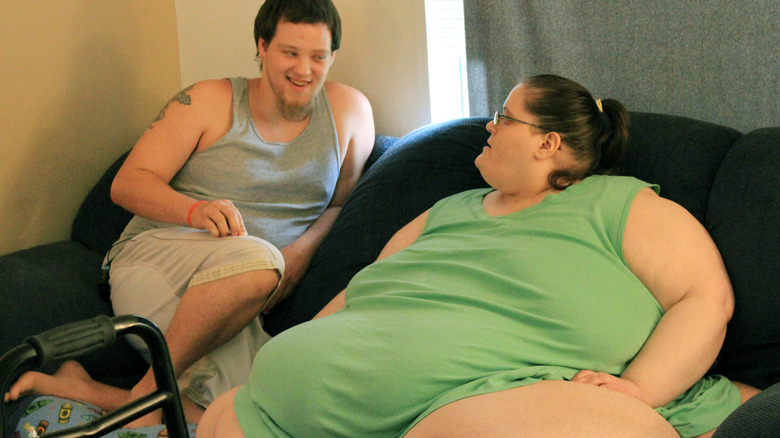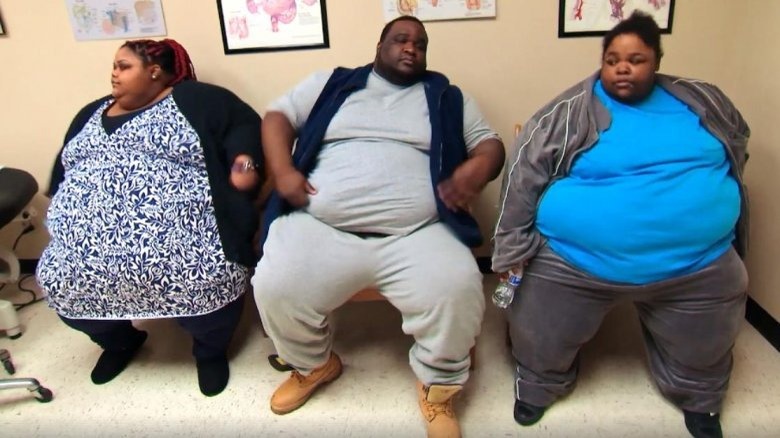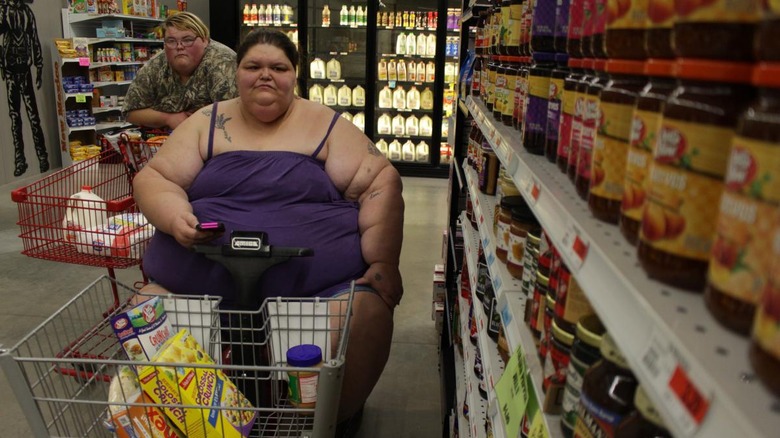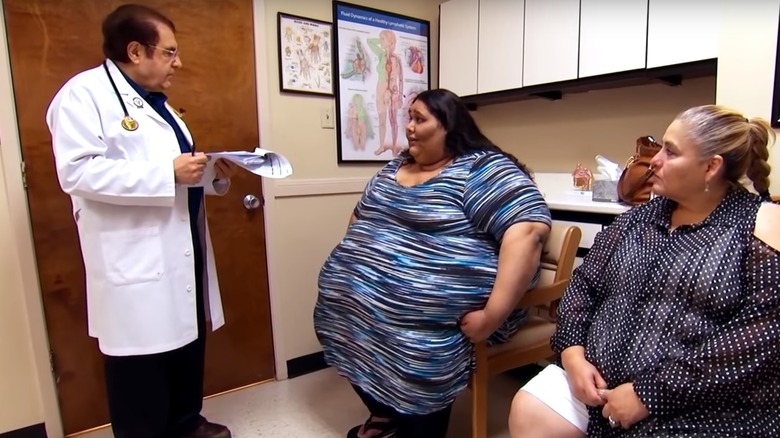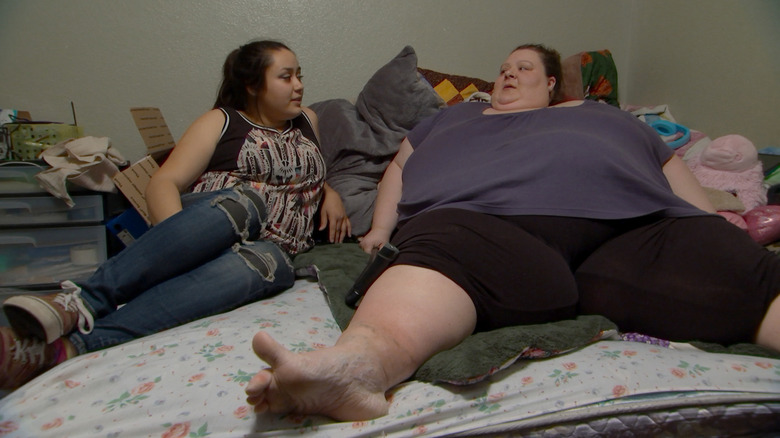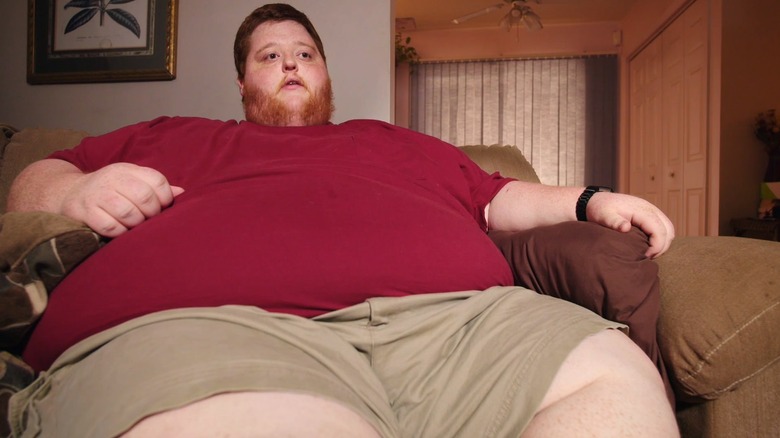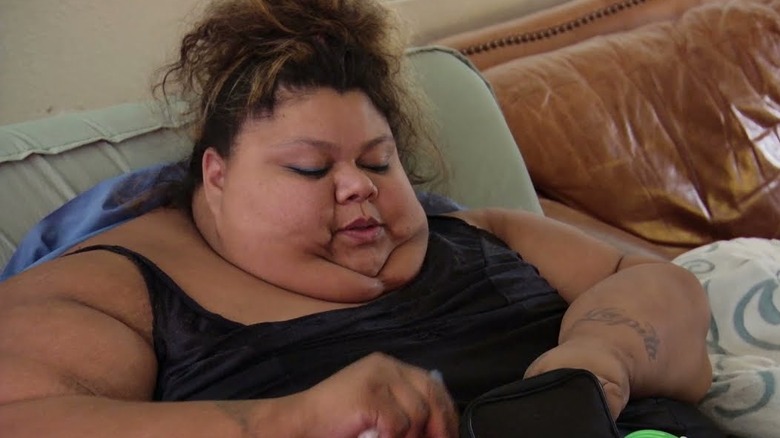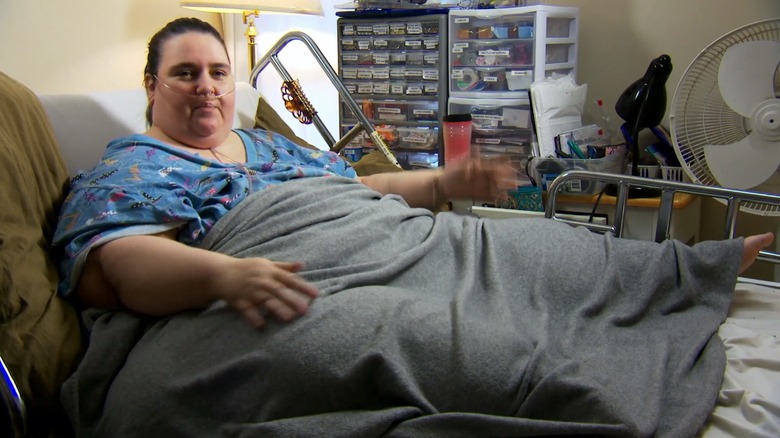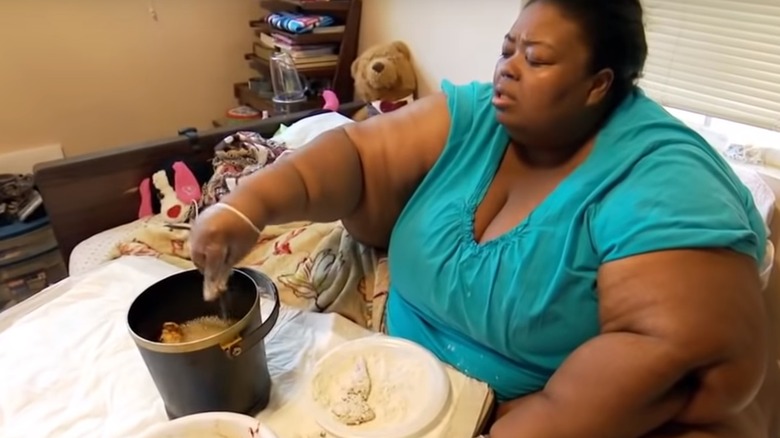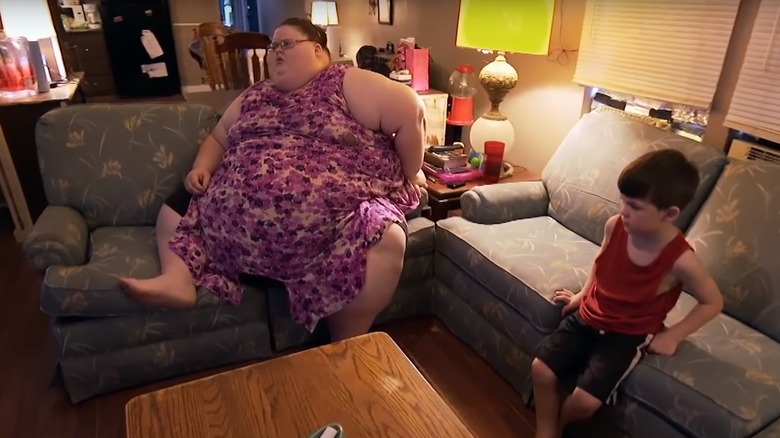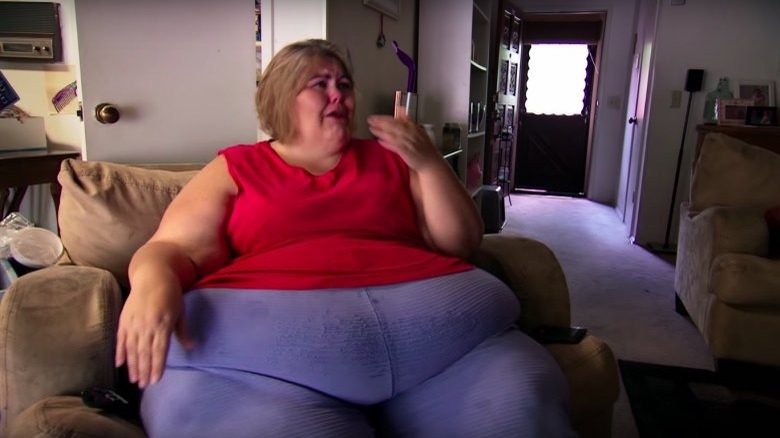How The Stars Of My 600-Lb Life Gained So Much Weight
The reality sensation My 600-lb Life is one of the most popular shows on the TLC network. The show is an hour-plus long program that follows its stars for a period of one year. The women and men on the show all start out weighing 600 pounds or more, putting them in dire straits and in need of serious medical intervention. But because of their size, most doctors and hospitals can't treat them because of both risk and equipment limitations.
Enter Dr. Younan Nowzaradan, the pioneering surgeon who has the skill and the will to help these patients turn their lives around. He's also as blunt and no-nonsense as he is talented, making him an unlikely yet quite likable reality television star. Dr. Now's ability to treat even the most obese people has undeniably made a difference in his patients' lives.
But how is it that the stars of My 600-lb Life become so dramatically overweight? Of course, it's pretty easy for most of us to gain some weight, but certainly not to tip the scales over the half-ton mark. So what mechanisms are really at play here? Read on to learn how the stars of My 600-lb Life gained so much weight.
Genetics are a factor
For some, it may be tempting to judge the stars of My 600-lb Life, and put the blame for their severe obesity squarely on their shoulders. That's because a lot of people think that maintaining a healthy body weight is as simple as balancing the calories taken in and calories exerted out. That certainly sounds like a simple and sensible explanation.
But the problem with that thinking is that there's more to the story than meets the eye, according to Dr. Now. "We need to spread the message that obesity is not a patient's choice," he penned in an article for Obesity Help. "That it is a metabolic and genetic disposition that people have, and this is a disease and needs to be treated as a disease." That's a seriously compassionate approach — that also just happens to be true.
That's why Dr. Now tries to help anyone who comes asking for it. "When it comes to my patient process, I don't have a selection process like most doctors have," he continued. He noted, "I don't have any selection process. Everybody comes and we take care of them." That's why he's able to help so many people.
Enablers play a role
If you're unfamiliar with the psychology that's involved with the patients on My 600-lb Life, it can be extremely confusing to see family and loved ones bringing the show's stars all kinds of unhealthy food. For example, on Amber's episode, her boyfriend helped her buy whatever she wanted at the grocery store, even though she could barely fit in the car. And on Laura's episode, her family went out for a meal with her, and brought her a platter of fried food even though she was in a wheelchair and on oxygen because of her weight. Wouldn't you think they could just stop, especially when many of the patients have mobility issues?
Well, many enablers feel the need to be needed, and are afraid to rock the boat lest they cause problems. So it's really not as simple as bringing a salad instead of a pizza to the table.
Overeating started early
It's been well-documented by the medical community that we are highly influenced by the environment we grow up in as children. By extension, the things that we look to for pleasure and nourishment at such a tender age also loom large in our young brains — including, and perhaps especially, food. "When we are born, food becomes the center, the first thing that child gets comfort from," Dr. Now explained in an interview with Houstonia. That means we associate food with happiness even as babies and toddlers — pretty crazy when you think about it, given that we don't remember much else as infants.
It logically follows, then, that when we encounter difficult scenarios as adults, it's not uncommon to search for the same kind of comfort in familiar things like food — another thing Dr. Now has acknowledged. "Later when people get into stressful situations, they go back to food," he continued. It's really not surprising, then, that eating can become a safe space for anyone, no matter how tough things may be in their lives. Unfortunately, eating constantly can result in dramatic weight gain, a common occurrence on My 600-lb Life.
Unhealthy foods are everywhere
In the United States, you have to be 18 years old, 19 years old, or 21 years old to buy tobacco products, depending on the state you live in, and 21 years old to buy alcoholic beverages. But there are no age restrictions on the food you can purchase, nor is there a limit to how much of it you can bring home with you. That means pretty much anyone can buy whatever foods they want — healthy or unhealthy — as long as they have the money for it.
Additionally, unhealthy food is available in an extraordinarily wide variety of places, like drive-throughs, grocery stores, restaurants, delis, and more. There's no shortage of processed carbohydrates, burgers and fries, potato chips, sugary drinks, cookies, candy, and more that are even available at gas stations and pharmacies. It seems like anywhere you look there's a treasure trove of calorie-dense snacks to behold.
That's why on most episodes of My 600-lb Life, viewers see the stars of the show at the grocery store, loading up their carts with foods that they know they shouldn't be eating. It's only after they comply with Dr. Now's diet that their purchasing patterns change, and they adopt healthier shopping and eating habits.
They suffered abuse as a child
The #MeToo movement, which was started in 2006 by Tarana Burke and amplified on social media by Alyssa Milano in 2017, has been a reckoning against sexual abusers. Additionally, one of the things that has emerged from discussions on the topic is that sexual abuse can have harmful impacts on victims, which can last for many years after the initial incident.
Viewers of My 600-lb Life may have known that before, however, as many of the patients featured on the show are survivors of childhood sexual abuse. For example, Ashley Reyes was sexually assaulted by her uncle when she was only 12 years old, which had devastating consequences. "I didn't know what to do," she confessed during her episode. "I didn't know how to feel safe. So I would eat to gain back whatever little happiness I could." To that end, Reyes kept eating until she hit 668.8 pounds, which was quite the shock for her when she learned just how much she weighed.
This kind of behavior after a traumatic event like the one Reyes experienced isn't uncommon, according to an article in Psychology Today. That's why so many of the show's stars share similar traumatic backgrounds.
They survived sexual violence
Just as being molested by a trusted friend or family member can cause someone to overeat, so too can sexual violence by multiple perpetrators have similarly damaging effects on survivors. Such was certainly the case for Kirsten Perez, who was gang raped at a party when she was 17 years old. "After that is when I started not caring about a lot of stuff," she recalled in her episode. "Maybe I ate cause I was hoping to keep people away from me — I don't know." What a horrific thing to have to endure.
Diana Bunch had a similar experience when she was 11 years old, when she was molested by two older boys at a skating rink — something that filled her deeply with shame. "I never told anyone cause I felt like it was something I did," she shared on her episode. "So I pushed it down and never talked to anyone because I didn't have anyone." That sounds extremely difficult and very lonely.
While it took many more years for Bunch to start compulsively overeating, Perez's eating habits spiraled shortly thereafter. But in both cases, it was sexual violence that was the catalyst for their binge eating.
Anxiety and depression can be crippling
There's a well-documented link between chronic overeating and mental health issues, according to Science Daily. Specifically, overeating is linked to an increased risk of both anxiety and depression, something viewers of My 600-lb Life are well aware of. That's because many of the show's stars have battled with one or both of these diagnoses.
Justin McSwain was open about how much he struggles with chronic anxiety and panic attacks on his episode, starting from when he wakes up in the morning. "It's a struggle, and I have a lot of anxiety," he confessed. "So when that first wave of pain hits me, I start to panic a little because my mind starts racing with all the things that can go wrong." In order to cope with those feelings, he turned to food, which helped him feel better momentarily — but only made his situation worse in the long run.
It got so bad that he became a reclusive shut-in, ordering everything he needed online just so he wouldn't have to leave the house.
Eating addiction is a real thing
Addiction comes in many forms, whether it's to alcohol, drugs, or any substance that allows people to reward their brain with serotonin, or any other chemical that results in pleasure centers being activated. Unfortunately, that also means that people who are addicted to substances have a harder time experiencing "normal" joys, like a beautiful view or rewarding time with a loved one, according to Harvard University. And, of course, addiction is not an easy thing to break, so the results can be quite damaging for addicts.
Just as people can become addicted to using drugs and alcohol, so too can they get addicted to eating food — something that every single patient on My 600-lb Life is contending with. That's because eating food triggers a dopamine response in the brain, according to an article in Neuroscience & Biobehavioral Reviews. So it follows that some people engage in eating patterns that get that good, happy feeling activated, but are unable to stop despite the consequences.
Their parents were addicted to drugs or alcohol
It's not just being sexually abused as a young person that can lead to people engaging in addictive behaviors. Rather, growing up in a household where a parent (or parents) are addicted to drugs and alcohol can also traumatize children. Additionally, children of addicts are about two times as likely to develop addictive behaviors themselves, according to American Addiction Centers. That can definitely cause someone, then, to overeat for comfort as a child, which can manifest in compulsive overeating as an adult.
That was definitely the case for Nicole Lewis, who was already overeating when her parents became addicted to cocaine — which led to their home becoming an unsafe place for her. "I was scared," she recalled in her episode. "And when my parents were doing the drugs, I would get so mad and I would scream and holler at them. And they'd just ignore me." That's a seriously bad situation.
In order to feel safe and secure, Lewis would shut herself in her room and eat until she fell asleep. By 16, she was almost 400 pounds, showing how devastating parental substance abuse can be.
Change is extremely difficult for anyone
Change is hard for anyone in many aspects of life, according to an article in Psychology Today. Whether it's learning how to stick to a budget, being more focused and productive at work, or trying to watch less television, it's just not an easy thing to adjust to. And for the stars of My 600-lb Life, making changes is absolutely essential, as falling back on their overeating and lack of movement can very well cost them their lives.
Some patients struggled with adopting Dr. Now's diet and exercise plan on the show more than others, which is understandable. But while the majority of the patients do eventually stick to the rules, get weight loss surgery, and work toward having a healthier life, some are just more resistant to change than others. For example, Penny Seager, who Dr. Now once famously called "delusional," expected weight loss surgery to be a magic solution, and resisted doing things the way she was supposed to. She even broke down and asked, "Where's my yellow brick road?" on her episode, while refusing to get out of bed. Yikes!
They endured a horrible crime
The majority of the stars on My 600-lb Life have had issues with their weight from a very young age, usually due to traumatic events. But that wasn't the case for Marla McCants, who didn't start gaining weight until she was in her 20s, when she became the victim of a horrible crime. As recounted by In Touch, McCants had tried to break up with her then-boyfriend but he "lost it" and kidnapped her, holding her hostage. McCants was held at gunpoint, and, when the police tried to rescue her, her then-boyfriend shot two officers and escaped. How absolutely terrifying.
By the time they caught her fugitive ex, she was already up to 700 pounds, and had completely shut herself off from the outside world. And while her reaction is extreme, post-traumatic stress disorder is linked to developing an eating disorder, according to an article in the Psychiatric Times. So McCant's reaction to the trauma of crime isn't uncommon, as food likely took her mind off of what she experienced.
Sedentary lifestyles contribute to weight gain
There are a lot of factors at play when it comes to how people become obese, according to Stanford Health Care. Obviously, one is diet: how much food you eat on a daily basis, as well as what kind of foods you consume. Your metabolism also plays a role, as hormone peptides like ghrelin help you regulate your appetite and help you feel satisfied. And, of course, there is the genetic component, which means that everyone stores fats and processes food a little differently.
The kind of lifestyle you live also has a hand in determining your body weight. If you work outside on a construction site, for example, you're going to get more exercise than someone who sits at a computer every day and doesn't have an exercise regimen. And when it comes to the patients on My 600-lb Life, many of them are too large at the start to move much at all, let alone have an active lifestyle. For example, Ashley Dunn was barely mobile during her episode, and she relied primarily on her 5-year-old son to help with the majority of her day-to-day tasks, something she wasn't proud of.
They refuse to go to therapy
In earlier episodes of My 600-lb Life, therapy wasn't discussed as an essential component of the weight loss process as much, at least in front of the camera. But as the show moved into later seasons, Dr. Now is more often shown telling patients that in order to lose weight and work the program successfully, they need to go to therapy to deal with their issues. Hands up if you're a huge fan of Lola Clay!
Not all of the show's stars are particularly enthusiastic about sitting down with a mental health professional at first, as they don't want to deal with their pain. Or perhaps they don't fully understand the link between their overeating and their emotions. For example, Ashley Reyes was initially hesitant to go to therapy in her episode, which impeded her weight loss. But after a breakthrough session with a therapist, she realized how important it was to confront those issues. "I know there is a lot from my past I'm going to have to face if I want to get my anxiety under control," she confessed in her episode. After that, her weight loss was jump-started.
Their partners don't want them to lose weight
Despite the fact that fatphobia is a reality in society, according to the International Journal of Eating Disorders, there are plenty of folks who are attracted to people with larger bodies. This is in spite of the very intense media messaging about what is considered attractive today, which tend to be thinner bodies, so often this can be a positive thing for a variety of people.
But sometimes, a person's desire for a certain body type can be harmful for their partner, especially if they're not sensitive to what their partner needs. Perhaps the most memorable instance of this on My 600-lb Life is Zsalynn Whitworth, who wanted to change her lifestyle so she could feel healthier and not worry that she was in danger of passing away. But her now ex-husband, Gareth, was not supportive of her journey, and the couple wound up ending their marriage. It just goes to show how much an unsupportive partner can hold back someone's weight loss.
